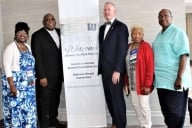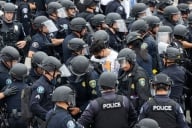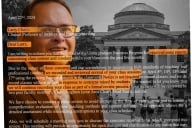You have /5 articles left.
Sign up for a free account or log in.
President Obama has promised to do everything in his power to curb gun violence. Now, several hundred college presidents are throwing their weight behind him.
As of Wednesday evening, more than 300 of them had signed on to two letters, one written by the president of Emerson College and the other by the leaders of Agnes Scott College and Oglethorpe University, that urged Obama to -- with their help -- actually do something about gun violence this time.
It’s not unusual to hear a college president here or there speak out against weapons specifically on campus, particularly when courts rule (as they have been wont to do lately) that campus gun bans are illegal. But many college presidents hesitate from speaking on public policy issues beyond those that are clearly higher education-related, such as student aid or visas for foreign students. Presidents said in interviews Wednesday that they hope enthusiastic support for the letters signifies that in the days to come, college presidents will take a more united and broad front on gun control as well.
Both letters were written out of sadness and frustration following last week’s massacre, in which 20 elementary school children and six teachers were murdered, but they take different approaches to addressing the issue. While the signatories of one offer up their resources to help start a comprehensive dialogue about gun violence, the presidents who signed the other want politicians to take specific steps – and fast.
“For many years now, our nation’s leaders have engaged in fevered debates on higher education, yet lawmakers shy away from taking action on one issue that prevents thousands of young people from living lives of promise, let alone realizing their college dreams,” reads the letter penned by Lawrence M. Schall of Oglethorpe and Elizabeth Kiss of Agnes Scott. “That issue is gun safety.”
The 160 presidents who have signed the open letter to policymakers (which is online here) are making four demands: oppose legislation allowing guns on college campuses, end the “gun show loophole” that allows people to buy guns from unlicensed sellers without undergoing a criminal background check, reinstate the ban on semi-automatic assault weapons and ban high-capacity ammunition magazines, and require consumer safety standards for all guns and regulations to prevent and correct manufacturing defects.
“You go back a century, and presidents were often looked to to speak on important public issues, and did. As time has gone on, we end up focusing so much on business issues and trying to raise money and competing with other schools that I think in some serious way we’ve lost our voice,” Schall said in an interview. “It just felt like, this is an issue on which I thought we might agree.” (It took only 36 hours for Schall to get all those signatures. They come from colleges in 40 states, mostly private institutions, about a quarter of which are in the South, a region that has largely resisted gun control laws.)
For the campus carry point in particular, Schall said, one would be hard-pressed to find a president who wants to allow guns on campus.
But David Burnett, director of public relations for Students for Concealed Carry on Campus, questions whether that “instinct to lash out and tighten down on gun restrictions” – particularly on campuses -- is rational, and whether it would have any effect.
“The first reaction that most people have in view of the Connecticut shootings is a feeling of helplessness, a feeling of wanting to do something…. even if it’s put your name to a piece of paper,” Burnett said. “The gun laws seem to be working. It’s the mental health system that really needs evaluation.”
The latter point is one on which Burnett and the presidents who signed the other letter agree.
Like much of the country, Emerson College President M. Lee Pelton felt confused, pained and devastated in the days following last week’s elementary school massacre. He sent a consoling letter to Emerson staff and students, but felt he needed to do more.
Then President Obama spoke at a vigil for the victims, promising to “use whatever power this office holds to engage my fellow citizens, from law enforcement, to mental health professionals, to parents and educators, in an effort aimed at preventing more tragedies like this.”
So Pelton decided to offer up assistance -- from himself and a couple hundred of his closest colleagues.
As of Monday afternoon, Pelton had received confirmation from about 150 college presidents who agreed to sign on to a letter Pelton sent out just a day before. (Pelton sent the letter to about 900 presidents, mostly at private colleges.) The signatories of the letter, which Pelton hopes to send to Obama by Dec. 24, urge the president to follow through on his words – and promise to help in ways that others can’t.
“Our nation looks to colleges and universities to solve its most pressing problems and these are issues on which we stand ready to provide a way forward,” Pelton wrote. “We, therefore, pledge to do what we do best in our academic communities: engage thought leaders, faculty, students, staff, trustees and friends in meaningful debate and dialogue, which, in turn, might lead to positive action.”
On Wednesday, Obama announced a new administration-wide task force that will explore policy changes and other avenues to curb gun violence. Vice President Joe Biden, a noted foe of the National Rifle Association, will head up the group. The task force’s proposals are due by the end of next month, and will likely include some new restrictions on assault weapons and high-capacity magazines. The panel may also may address related societal issues, such as mental health.
The college presidents who signed Pelton's letter single out curtailing assault weapons as a top concern of theirs, but also call for “serious consideration” of mental health and other societal issues that are intertwined with gun violence.
The dialogue that could emerge from such a consortium is “a real contribution we can make – it’s not an ivy tower exercise,” he said.
“We believe that the conversation regarding gun violence and mass killings are long overdue, especially as it relates to assault weapons,” Pelton said. “I for one believe that college and university presidents have an obligation to exercise their civic and moral leadership.”
Adam Lanza, the 20-year-old who killed 26 people and then himself at Sandy Hook Elementary School in Newtown Conn., took classes at Western Connecticut State University as a teenager. James Holmes and Jared Lee Loughner, who committed mass murders in Aurora, Colo. and Tucson, Ariz., respectively, had also been college students at one point. Colleges have also been the sites of shootings, including the Virginia Tech massacre and more recently when a man who killed his father, an instructor at Casper College, in front of a classroom of students -- having earlier killed another instructor at the Wyoming community college.
The topic of guns and where they belong has been much-discussed across higher education throughout the past year -- but, for the most part (if not all of it), in the context of individual campuses, which administrators nearly always argue are safer without the weapons.
More than 200 campuses in six states allow concealed carry in some form, according to Students for Concealed Carry on Campus, which filed the lawsuit that in March forced the University of Colorado to scrap its controversial gun ban when the Colorado Supreme Court ruled it violated state law. That ruling came five months after one in Oregon that had the same effect.
Advocates for concealed carry argued that those rulings, coupled with others in Wisconsin and Mississippi, shifted the momentum to their side. Those policy changes will better allow students and others to protect themselves, SCCC argues, and rid campuses of their “gun-free zone” façade (as it’s impossible to know that bans are effective without metal detectors at every entrance).
However, legislation in 14 other states introduced in 2012 either died, stalled, was deferred or vetoed, according to the Campaign to Keep Guns Off Campus.
"It's one thing to sort of speak out on an issue in which you think no one will listen, but we're joining a chorus of people who are just outraged," Schall said. "This tragedy seems to have galvanized people, and maybe will represent an opportunity for a change in the law of the land."








